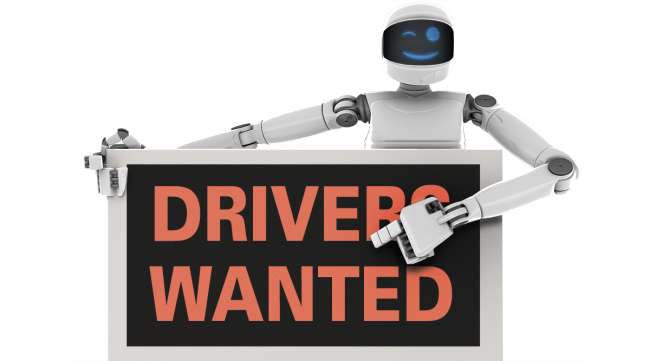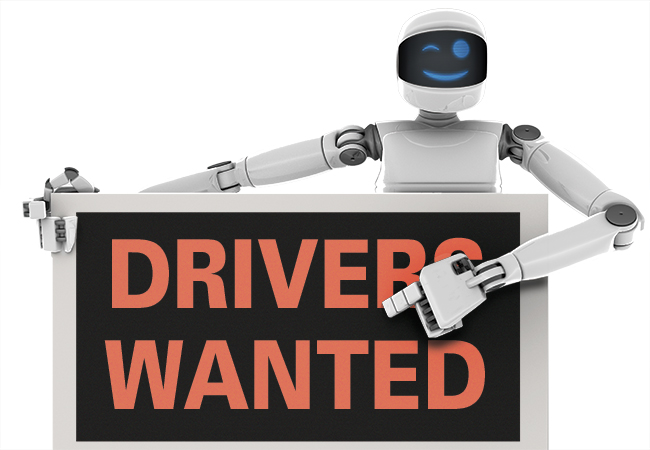In Driver Recruiting, AI Gets Real

While the wonders of artificial intelligence often are hyped beyond recognition, AI-powered recruitment software actually is offering real advantages to trucking companies. Across many industries, scores of firms are using AI-driven recruitment software to automatically crawl the web for the kind of job candidates that companies want, auto-interview them via text chat or video on the spot, and then auto-schedule the most promising candidates for follow-up interviews by in-house recruiters.
Other programs automatically rifle through résumés submitted at your website for candidates with the qualifications you want.

Dysart
And still others design neuroscience games your job candidates can play, which glean the people who best exhibit the traits, skills and characteristics you’re looking for.
“Artificial intelligence has the potential to deliver what recruiting has been craving for — find more and better candidates, and reduce time and cost to hire,” said Shobhit Gupta, business strategy and operations lead at AllyO, an AI-driven recruiting software company.
The recruiting help from AI could not come at a more urgent time for trucking companies. Unemployment is at an historic-low 4%, according to the U.S. Bureau of Labor Statistics.
And trucking’s ongoing problem of trying to find good drivers to move increasing amounts of freight continues unabated. American Trucking Associations’ most recent trucking activity report, for example, found that the annualized turnover rate at large truckload carriers — fleets with more than $30 million in annual revenue — jumped 6 points to 94% in the first quarter of 2018.
“The uptick in turnover is consistent with continued tightness in the market for drivers,” ATA Chief Economist Bob Costello said. “Anecdotally, carriers continue to struggle both recruiting and retaining quality drivers — leading to increasing wages. Finding enough qualified drivers remains a tremendous challenge for the trucking industry and one — that if not solved — will threaten the entire supply chain.”
Indeed, according to a March survey released by HireRight, a provider of background checks and related services to truckers, 76% of transportation industry pros say they will be looking to bring on new workers this year.
Of course, despite facing a pressure to hire, trucking companies need to use care in choosing an AI recruiting solution.
Tom Benusa, chief information officer at Transport America, said he likes the idea of an AI recruiting solution that can scan résumés and reach out to candidates automatically — as long as it can be tailored to the trucking industry.
Such software would be helpful to a trucking company, assuming the data being scanned — namely, résumés — is specific enough to ascertain details such as the job candidate’s amount of truck driving experience and the driving job type — such as over-the-road, local/dedicated, solo or team, Benusa said.

But the company wouldn’t want to contribute to “robo-calling” by reaching out to folks who have no interest in driving for an OTR trucking company, he added.
David Roush, president of KSM Transport Advisers, shares the same enthusiasm and caution when it comes to recruiting with AI: “Drivers are in huge demand, and they have important control of what processes work and what processes do not work.
Driver hiring processes must be “driver friendly” and fast, and they need to take advantage of current technology — social media, electronic vetting and the like — in a way that is easy for both drivers and recruiters, he said.
Commercial job boards already are using AI and “big data” software to sift through databases for truck drivers who are looking for jobs as well as the kind of driving jobs they would like next.
But the downside of such automated processes so far is that drivers “get a large amount of unsolicited job information via the internet and the telephone,” Roush said.
Any AI recruiting solution KSM brings in-house or uses as a service would need to be free of such a scattershot approach, he said.
Despite those caveats, AI recruiting nonetheless has become wildly popular. According to a 2018 survey by business consulting firm Korn Ferry, 63% of human resource pros said AI has changed the way they recruit — and 69% said AI has helped them source better candidates.
Given AI’s potential, you’ll want to check out a representative sampling of what you can do with AI recruiting software:
• Robot Vera: A chatbot recruiter, Robot Vera can be embedded on your website to instantly interview people who submit résumés or apply for a job with your trucking company. Core to the application is a self-learning neural network, which initially was trained to chat with people by reading Wikipedia, “watching” TV shows and studying help wanted ads and job interview questions.
Moreover, each time Robot Vera interacts with a person, it is programmed to learn from that experience and be smarter when chatting with the next person.
The software also can automatically scan résumés on job sites, phone candidates with the right qualifications on those résumés and propose an interview on the spot — either automated or with a human. Also, Robot Vera is relentless: It can make up to 10,000 phone calls simultaneously.
• VCV AI: Similar to Robot Vera, VCV can screen hundreds of thousands of resumes to find the kind of staff you’re looking for, and then reach out to prospects, offering either an online chat or phone call as an interview format.
Like Robot Vera, it can make hundreds of calls per minute. And it uses voice recognition technology to “talk” with job candidates and fill them in on details about your job opening.
The system also can be programmed to use facial recognition — combined with predictive analytics — to screen for the personal characteristics you’re looking for in an employee.
• Mya: Similar to VCV AI and Robot Vera, Mya chats up people applying for jobs at your company — as well as people not searching for work who look like good prospects.
After screening and qualifying, Mya sends its picks to your company’s applicant-tracking system, along with a transcript of its interviews with the promising candidates it has found.
• Entolo: The key component of Entolo’s software is an AI-driven web crawler, which looks into every nook and cranny of the web — including LinkedIn, Facebook and Twitter — to find candidates that match the kind of people you’re looking for.
It also automatically sorts, analyzes and ranks a person’s fitness for an open position across several attributes, including job title, work history, skills, likeliness to leave their current role and more.
Promising candidates also are directly contacted by Entolo — either automatically, or on a schedule designed by the person doing your hiring. And its follow-up messaging helps ensure you stay in contact with your most promising prospects.
• Google Hire: Already a popular recruiting program, Google Hire got an AI upgrade this year that helps eliminate many of the repetitive tasks associated with the hiring process.
Google Hire’s AI, for example, can be programmed to highlight the skills you’re looking for in the résumés your company received.
It also can help automatically schedule interviews with promising candidates.
• ZipRecruiter: One of the largest online employment services in the United States, ZipRecruiter has an AI component that can be used to surface the most promising candidates on its board.
The feature works by studying how employers rate the people applying for work on ZipRecruiter. Generally, people who apply for any and all jobs on the jobs board are very likely to get a “thumbs down” rating from the employers who use the service — so the system eliminates such candidates from serious consideration.
Next, candidates who get a “thumbs up” from employers are studied for the traits, skills and characteristics they exhibit — insights that ZipRecruiter uses to recommend candidates with a similar profile.
• Pymetrics: Pymetrics is a specialized AI HR tool that enables you to assess the character and skills of prospective employees via games it furnishes candidates to play.
Pymetrics mines insights into those games by inviting your existing, most successful employees to play its neuroscience games, and then gleaning data on their traits and strengths based on the way those employees play those games.
Subsequently, Pymetrics uses that data to judge potential hires who play the same games, looking for people who have the same traits and characteristics of successful people already working at your company.
• Arya: Arya takes a similar approach to AI hiring by studying the traits, skills and characteristics of employees you consider to be the most successful and then scours the web for job candidates with similar profiles. The program also gets smarter over time about the people you’re looking for by studying the performance of your existing employees based on their performance reviews, the speed at which they are promoted and the length of time they stay at your company.
Joe Dysart is an internet speaker and business consultant based in Manhattan. Voice: (631) 438-1142. Email: joe@joedysart.com. Web: www.joedysart.com.




